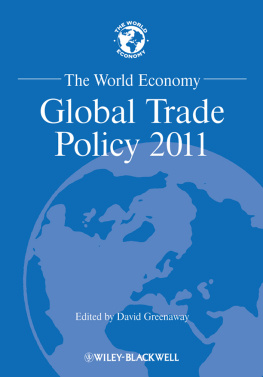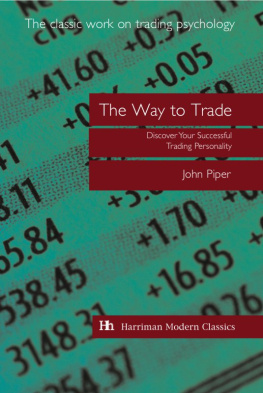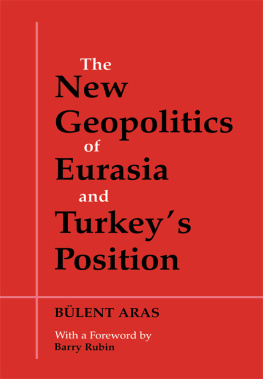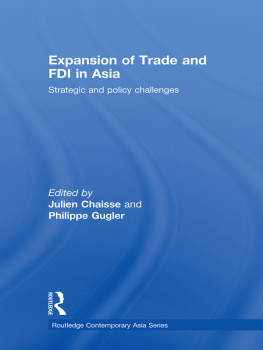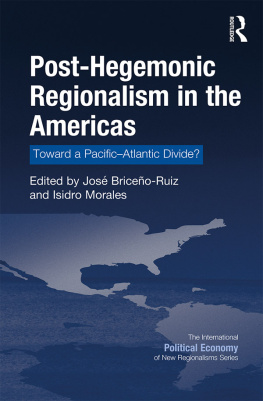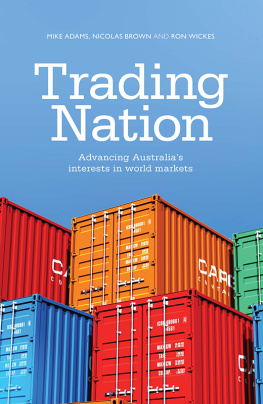THE POLITICAL IMPORTANCE OF REGIONAL TRADING BLOCS
The Political Importance of Regional Trading Blocs
Edited by
BART KERREMANS
Associate Professor, Catholic University Leuven
BOB SWITKY
Assistant Professor, State University of New York, Brockport
First published 2000 by Ashgate Publishing
Reissued 2018 by Routledge
2 Park Square, Milton Park, Abingdon, Oxon OX14 4RN
711 Third Avenue, New York, NY 10017, USA
Routledge is an imprint of the Taylor & Francis Group, an informa business
Copyright Bart Kerremans and Bob Switky 2000
All rights reserved. No part of this book may be reprinted or reproduced or utilised in any form or by any electronic, mechanical, or other means, now known or hereafter invented, including photocopying and recording, or in any information storage or retrieval system, without permission in writing from the publishers.
Notice:
Product or corporate names may be trademarks or registered trademarks, and are used only for identification and explanation without intent to infringe.
Publishers Note
The publisher has gone to great lengths to ensure the quality of this reprint but points out that some imperfections in the original copies may be apparent.
Disclaimer
The publisher has made every effort to trace copyright holders and welcomes correspondence from those they have been unable to contact.
A Library of Congress record exists under LC control number: 00133524
ISBN 13: 978-1-138-73844-7 (hbk)
ISBN 13: 978-1-315-18479-1 (ebk)
Contents
Bart Kerremans and Bob Switky
Bob Switky
Rafael Reuveny and William R. Thompson
Quan Li
Bart Kerremans
Bart Kerremans
Sheny L. Bennett and Erick Duchesne
David A. Lynch
Share of intra-and inter-regional trade flows in each regions total merchandise exports (1997)
Explaining Regional Trade Bloc Formation: Higher Level Analyses
Explaining Regional Trade Blocs: Lower Levels of Analysis
Trade Blocs as Instruments of Foreign and Domestic Policy
A Long Run View of US Tariff Levels, Trade Proportion, and Regional Encapsulation
Correlation Matrix for Regionalization, Trade/GDP, and Tariffs
Cross-correlations for Regionalization, Trade/GDP, and Tariffs
Comparison of Institutional Variations
Institutional Variations across Seven Trade Blocs
Ration of IntraBloc Trade over Bloc Trade with Nonmembers
Parameter Estimates of the Gravity Model with Bloc Dummy Variables
Parameter Estimates for Testing Effects of Institutional Variations among Trade Blocs
Efforts of EC Enlargement and Trade Preferences
Share of EC-Initiated RTAs in the RTAs Reported to the WTO (1957-97)
EU Trade, U.S. Trade, and Transatlantic Trade
Structure for the Development of the TEP Action Plan
Types of Trade Conflicts in Transatlantic Relations
Sherry L. Bennett received her Ph.D. from Michigan State University. She is an Assistant Professor of Political Science at Rice University and currently a Visiting Scholar at the University of California, Berkeley. Her current research interests include the examination of domestic constraints on international trade policy and the resolution of trade disputes in domestic and multilateral organizations.
Erick Duchesne is an Assistant Professor in the Political Science Department at the University at Buffalo, SUNY. He also taught at the Facult St. Jean of the University of Alberta and Michigan State University, where he received his Ph.D. in 1997. He specializes on the impact of domestic politics on international economic negotiations.
Bart Kerremans is an Associate Professor in the Political Science Department at the Catholic University Leuven (Belgium). His research focuses on international trade policies especially of the European Union and on EU decision-making in general. He has published in various journals including Governance, the Journal of World Trade, and Regional and Federal Studies.
Quan Li, Ph.D., the Florida State University, 1998; Assistant Professor of Political Science at the Pennsylvania State University, University Park, Pennsylvania. Specializes in international relations and international political economy in particular. Ongoing projects include regionalism, capital control liberalization, macroeconomic policy coordination among the major powers, and the effects of globalization on interstate conflict and democratization.
David A. Lynch, Ph.D. is an Assistant Professor of Political Science at Saint Marys University of Minnesota. He received his Ph.D. from the University of California, Santa Barbara. His research foci are trade and American foreign policy. Publications include The WTO and Trade, an annual contribution in A Global Agenda, published by the United Nations Association of the USA.
Rafael Reuveny is an Assistant Professor in the school of public and environmental affairs (SPEA) in Indiana University, Bloomington. He holds a double major Ph.D. in Political Science and Business Economics and Public Policy from Indiana University. His research deals with the political economy of international trade, the relationship between trade and conflict, the link between conflict and economic growth in the long run, and the relationship between conflict and environmental scarcity. He has published papers in various journals including American Journal of Political Science, International Organization, International Studies Quarterly, Journal of Conflict Resolution, Journal of Peace Research and Review of International Political Economy.
Bob Switky is an Assistant Professor at the State University of New York at Brockport. He received his Ph.D. from the Claremont Graduate University in California. His research interests include European Union politics and international political economy. He has written on European Union external trade policies and has a forthcoming publication of an international relations textbook (Addison-Wesley-Longman, 2000). He is also involved in a project on the determinants of trade policies in cultura industries.
William R. Thompson is Professor of Political Science at Indiana University. His most recent publications include Great Power Rivalries (1999) and The Emergence of the Global Political Economy (2000). Current research interests include strategic rivalries, North-South IPE, evolutionary approaches to IR theory, and modeling ancient world system dynamics.
AAMA
American ManufacturersAssociation
ACTWU
Amalgamated Clothing and Textile Workers Union
ACP
African Caribbean and Pacific
APEC
Asian Pacific Economic Cooperation
ASEAN
Association of South East Asian Nations
ATMI
American Textile Manufacturers Association
BCNI
Business Council on National Issues
BQ
Bloc Qubcois
CAFE
Corporate Average Fuel Efficiency
CEEC
Central and Eastern European Countries
COG
Chief of Government


